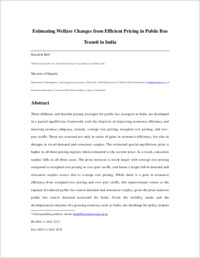Estimating welfare changes from efficient pricing in public bus transit in India
- Deb, Kaushik TERI University, Vasant Kunj, New Delhi, India
- Filippini, Massimo Istituto microeconomia e economia pubblica (MecoP), Facoltà di scienze economiche, Università della Svizzera italiana, Svizzera
-
2011
Published in:
- Transport policy. - Elsevier. - 2011, vol. 18, no. 1, p. 23-31
English
Three different and feasible pricing strategies for public bus transport in India are developed in a partial equilibrium framework with the objective of improving economic efficiency and ensuring revenue adequacy, namely average cost pricing, marginal cost pricing, and two-part tariffs. These are assessed not only in terms of gains in economic efficiency, but also in changes in travel demand and consumer surplus. The estimated partial equilibrium price is higher in all three pricing regimes when compared to the current price. As a result, consumer surplus falls in all three cases. The price increase is much larger with average cost pricing compared to marginal cost pricing or two-part tariffs, and hence a larger fall in demand and consumer surplus occurs due to average cost pricing. While there is a gain in economic efficiency from marginal cost pricing and two-part tariffs, this improvement comes at the expense of reduced public bus transit demand and consumer surplus, given the price inelastic public bus transit demand estimated for India. Given the mobility needs and the developmental concerns of a growing economy such as India, the challenge for policy makers is to balance the gains in economic efficiency in the public bus transit sector against other social, political, and developmental goals.
- Language
-
- English
- Classification
- Economics
- License
-
License undefined
- Open access status
- green
- Identifiers
-
- RERO DOC 21539
- DOI 10.1016/j.tranpol.2010.05.004
- ARK ark:/12658/srd1318165
- Persistent URL
- https://n2t.net/ark:/12658/srd1318165
Statistics
Document views: 172
File downloads:
- Texte intégral: 353
